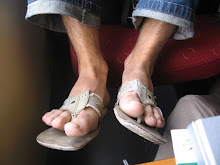A slum is a place which forms a cheap way to dwell, mostly for the large stream of people going from rural areas to the large cities to find a job.
This migration movement is triggered by the evolvement of a global economic network which enhances the forming of large companies and corporations, which generate all kinds of activity around transportation nodes (places where man can easily travel to, preferably by use of different flows of transportation). This global network draws attention to cities, which are often well connected to such a network (airports, large train- and bus stations). This in a way explains both the explosive way cities are expanding and the enormous investments which are put onto urban areas, both by private and public investors. This process has been initiated by the development of economy, technology and accordingly, society.
It is roughly what can be described as the process man refers to as globalization.
This process creates the stream of people to cities, who are not able to afford regular dwelling, and therefore live in slums, where life is reasonably cheap. One should be aware of the fact the dwellers of the slum (in the case of the larger ones) are still of great political and economic importance. For example; there are NGOs which are located in areas marked as a slum.
Define
It is hard to give a clear definition of what a slum is. In first instance this might seem clear; features as poor housing, a certain level of informality and lack of a certain level of public facilities (police control, pavement, sewage and so forth) can pretty much characterize what one at first sight might describe as such. However so, the issue becomes more relevant where, due to urban rehabilitation processes and appropriation of ground areas defined as slum seem to thereby loose a right of existence. The ones resident to these areas are, as it were, deprived of the right to inhabit the house they have, as it has, for which ever reason been marked in which ever way less valuable than the urban parts surrounding it. Which ever features might define what a slum is and what is not, it may be clear that the demarcation of any urban area as such is to be seen as a recognition of this area as less, even unsatisfactory valuable and this demarcation therefor implicitly calls for a certain action. The recognition of slum-areas as such can, and often do serve, and have done so, as political instrument to initiate a certain action. Clearly, the given of action, provoked by this demarcation represents interests. Onward is it most likely to presume that these interests serve in first instance the one to define, rather than the defined.
Is is therefore valuable to identify some elements which can form entities which are understood to be one.
One of the most striking features of slums is a certain degree of randomness in the way the building is structured, next to this; it is related to an urban area which, for whatever reason, can be marked as being no slum. Further, elements like a certain degree of poverty and diminished governmental formality (both in building decree and social control) seem to be returning issues when the definition slum is used.
This does not mean that there are no governmental rules present in these urban agglomerations, nor that these can not be planned, even though in many cases building is done by the dwellers of the neighbourhood.
In most slums there are strong social networks which are hard to penetrate, with in many case some kind of hierargic structure. These structures do not overlap entirely with the morphological existence of the slum. Again, one should have an open mind towards the notion slum, whereas it can be seen both as a place where crime flourishes, creativity finds it’s ultimate climate, a place which is a city (village) in itself, part of a city and a loose element of the city having some sort of symbiotic relation with it. This, although the borders of the slum are in no way clearly definable (spatially, politically, socially, economically, etc…).
One of the most striking features of slums is a certain degree of randomness in the way the building is structured, next to this; it is related to an urban area which, for whatever reason, can be marked as being no slum. Further, elements like a certain degree of poverty and diminished governmental formality (both in building decree and social control) seem to be returning issues when the definition slum is used.
This does not mean that there are no governmental rules present in these urban agglomerations, nor that these can not be planned, even though in many cases building is done by the dwellers of the neighbourhood.
In most slums there are strong social networks which are hard to penetrate, with in many case some kind of hierargic structure. These structures do not overlap entirely with the morphological existence of the slum. Again, one should have an open mind towards the notion slum, whereas it can be seen both as a place where crime flourishes, creativity finds it’s ultimate climate, a place which is a city (village) in itself, part of a city and a loose element of the city having some sort of symbiotic relation with it. This, although the borders of the slum are in no way clearly definable (spatially, politically, socially, economically, etc…).

1 opmerking:
thanks for keeping notes about slums.im very thankful to u
Een reactie posten